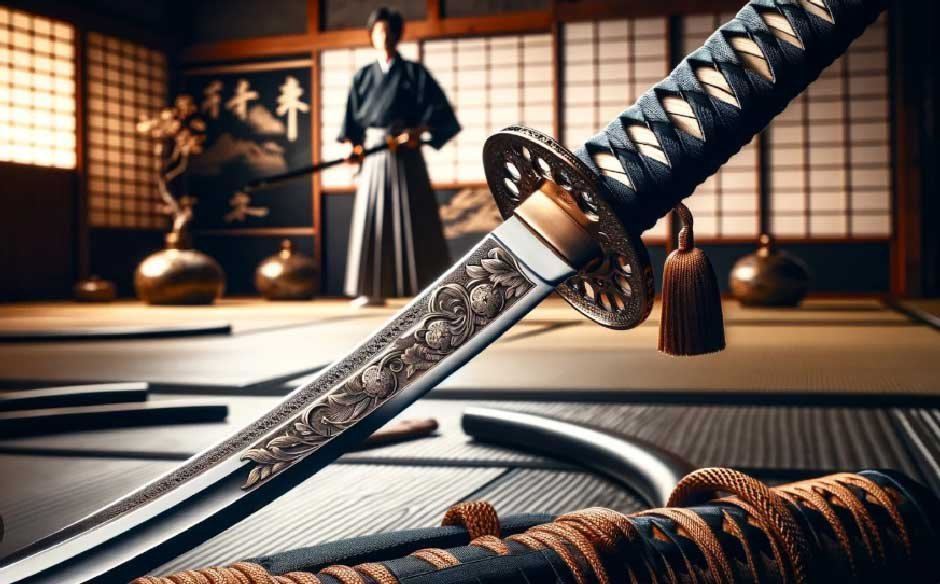Skip to the good bit
ToggleFew artifacts in human history capture the essence of artistry, functionality, and cultural significance as profoundly as the Japanese katana. Known worldwide as the sword of the samurai, the katana is more than a weapon—it is a symbol of discipline, honor, and the meticulous craftsmanship that has been refined over centuries. To truly understand the katana is to explore the spirit infused within its steel, a reflection of the culture and philosophy of its makers and wielders.
A Masterpiece Forged in Tradition
The process of creating a katana is an intricate and sacred art, honed through centuries of tradition. It begins with tamahagane, a high-carbon steel produced in a traditional tatara furnace. This raw material is folded and hammered repeatedly to remove impurities and create a blade with exceptional strength and flexibility. Each fold not only improves the blade’s integrity but also symbolizes the dedication of the swordsmith, who imbues the steel with a sense of purpose.
The katana’s iconic curved shape is not just aesthetically pleasing; it is a result of careful engineering. The blade is crafted with two types of steel: a hard outer layer that maintains a razor-sharp edge and a softer inner core that provides flexibility. This dual structure allows the sword to withstand impact without breaking, embodying the balance of strength and resilience.
The Polishing of Perfection
After forging, the blade undergoes meticulous polishing, a process that can take weeks to complete. The polisher uses a series of increasingly fine stones to reveal the blade’s hamon, the wavy line created during the tempering process. This line is not merely decorative—it is a testament to the precise craftsmanship and careful heat treatment that ensure the blade’s durability and cutting edge.
The polish transforms the katana into a work of art, enhancing its beauty while preserving its deadly functionality. In this phase, the blade’s soul begins to shine through, reflecting the dedication and skill of its maker.
A Symbol of Samurai Philosophy
For the samurai, the katana was more than a weapon; it was an extension of the warrior’s soul. The sword embodied the principles of bushido, the samurai code of honor that emphasized loyalty, courage, and discipline. The katana was treated with the utmost respect, often given a place of honor in the home and passed down through generations as a cherished heirloom.
Carrying an authentic Japanese sword was a privilege reserved for the samurai class, and its use demanded rigorous training. The art of swordsmanship, or kenjutsu, was not just about mastering combat techniques—it was a spiritual practice that sought to harmonize the mind, body, and spirit. Through this discipline, the samurai developed a deep connection with their katana, viewing it as a living entity that deserved reverence.
The Katana in Modern Times
While the age of the samurai has long passed, the katana continues to hold a revered place in Japanese culture. Modern artisans, often descendants of historic swordsmith families, keep the tradition alive, crafting katanas using techniques that remain largely unchanged. These blades are no longer made for battle but for collectors, martial artists, and cultural enthusiasts who value their historical and artistic significance.
In popular culture, the katana has become a global icon, featured in countless films, novels, and video games. Despite this widespread recognition, the true essence of the katana remains rooted in its history, craftsmanship, and the philosophy it represents.
The Soul of the Blade
To hold a katana is to feel the weight of history and the spirit of the countless artisans and warriors who came before. Each blade tells a story, not just of battles fought but of the unyielding pursuit of perfection. The katana’s soul is found in its steel, shaped by fire and forged with unwavering dedication.
In the end, the katana is more than a sword—it is a timeless symbol of the harmony between art and utility, a reflection of a culture that cherishes discipline, respect, and the enduring spirit of craftsmanship. To understand the katana is to glimpse the soul of Japan itself, forever immortalized in steel.







